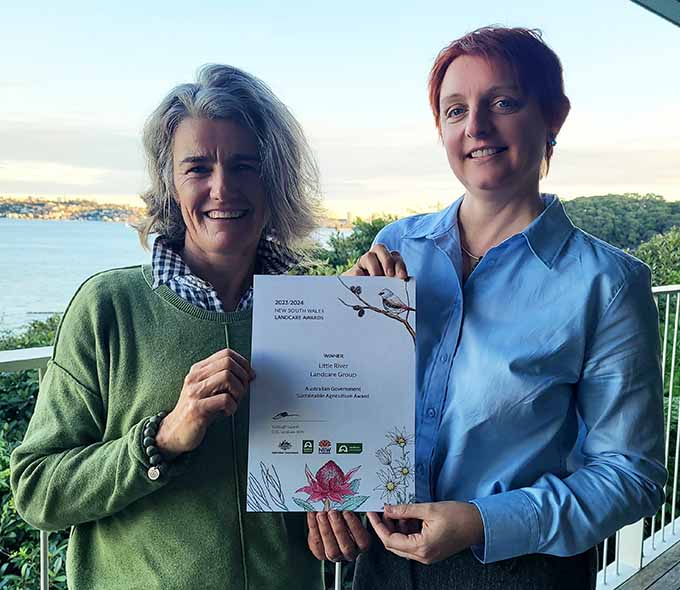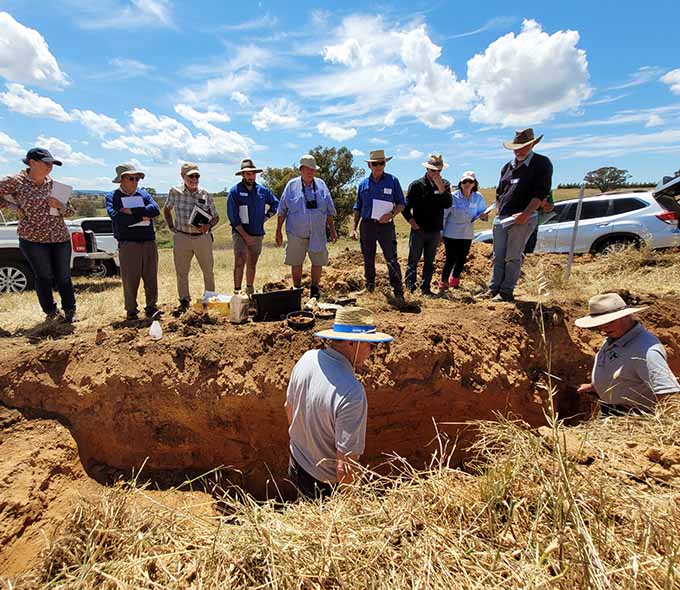Soil PET project wins Sustainable Agriculture Landcare Award
A partnership between the NSW Department of Climate Change, Energy, the Environment and Water, the Little River Landcare Group and the Soil Knowledge Network improves soil knowledge and land management in Central West NSW.

Promoting best practice land management
The Soil PET (People, Education and Technology) project was conducted in Central West NSW using workshop days on properties. The project aimed to:
- improve landholders' soil knowledge and management strategies
- describe, test and digitally capture soil field data in the NSW Soil and Land Information System
- digitally share soil descriptions and laboratory data.
The project won the Australian Government Sustainable Agriculture Landcare Award 2024 for demonstrating excellence and leadership in putting sustainable and integrated land management practices into action on farm property, protecting soils, water, vegetation and biodiversity. The award recognises practices that improve natural resource management and farm productivity.
Using soil tools and expertise
The Soil and Landscape assessment team from the NSW Department of Climate Change, Energy, the Environment and Water provided the department's in-house digital tools and expertise to describe, capture and share the entire project's profile data.
Soil samples were collected by Little River Landcare and analysed at various laboratories, while the Soil and Landscape Assessment team compiled the field profile descriptions and laboratory results in the database. The profile information was then made publicly available via eSPADE, a maps-based internet spatial viewer.
The Soil Knowledge Network provided reports on soil laboratory test results, site details, and how to interpret soil test results. They also showed landholders how to conduct simple field tests such as dispersion, texture, colour and pH. The workshops were designed to build understanding of each soil testing parameter, including ideal ranges for key nutrients and the relationships between them. They also considered common soil constraints such as acidity, sulfur deficiency, and manganese toxicity.
Benefiting landholders and the environment
Soil sampling, test results and reports were completed across 75 properties throughout Mid Macquarie, Coonamble, Orange, and Mudgee, creating potential to improve land management for about 142,500 hectares of land. In total, the project collected 629 soil profile sites, 26 pits fully field described, and 1,337 samples, resulting in 35,008 individual soil test results reported for the project. All this data is available through eSPADE.
Participating farmers improved their knowledge of soil health and implemented on-farm management changes based on their soil analysis results.
One landowner from Yeoval, who was involved in the program said: 'We have spread over 55 tonnes of gypsum as a direct result from the testing, in turn producing a more favourable soil chemistry to increase soil structure, root development and plant longevity for an overall benefit to landscape and animal health.'
The project led to strong ongoing connections between landholders and project partners, resulting in farm-specific, environmentally beneficial outcomes for the land in Central West New South Wales.
